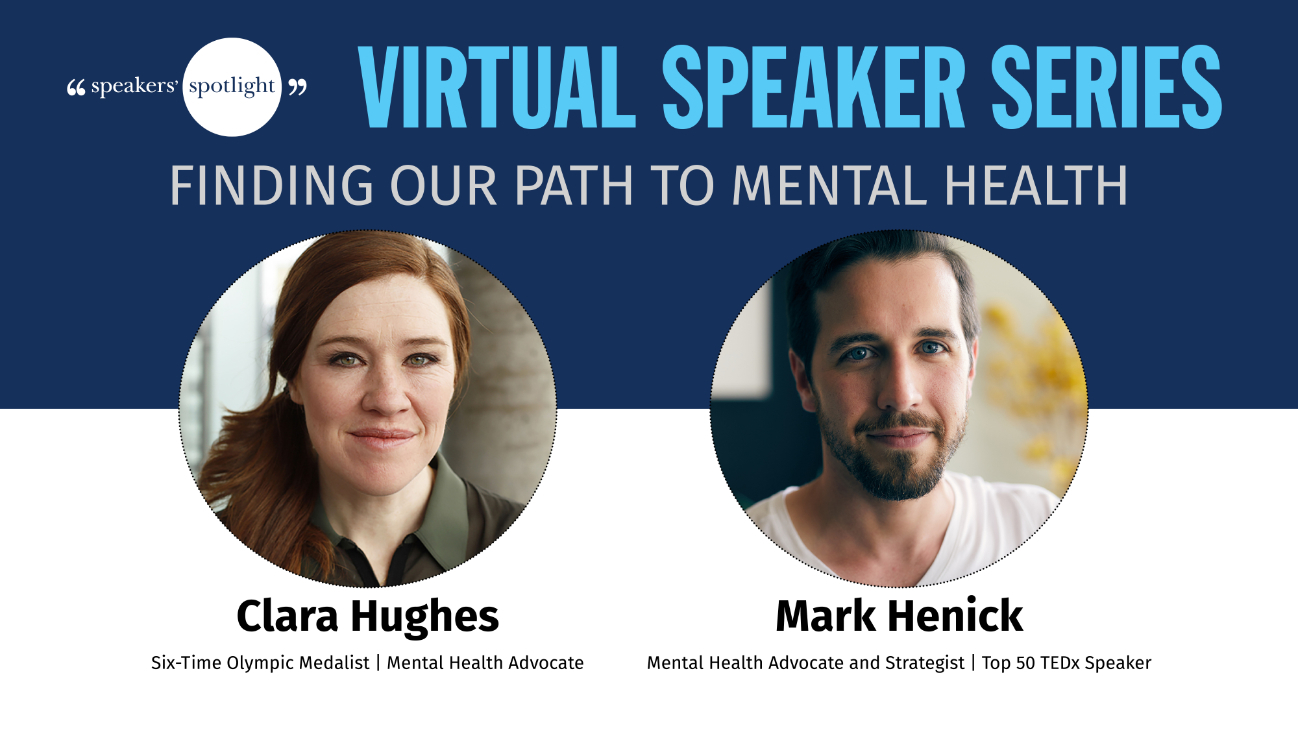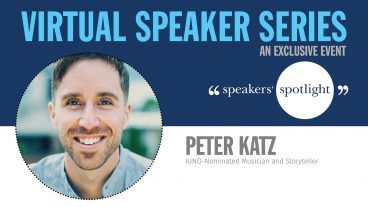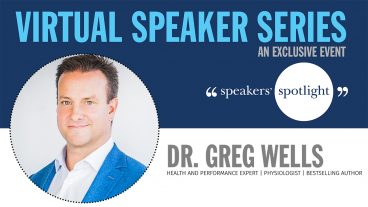Joining us for a special joint Virtual Speaker Series session on grappling with mental health issues, Olympian Clara Hughes and mental health advocate Mark Henick shared their experiences and offered advice to the audience on how to start on a path to healing. With passion, honesty, and emotional openness, the two took turns explaining their personal struggles and offering advice on coping, healing, and offering support to others.
Clara, the six-time Olympic medalist, spoke first. Her story connects childhood trauma at home to self-destructive behaviour and addiction as a teenager, which was then replaced by a different kind of addiction in the form of extreme training and competition. As she put it, while she was developing as an athlete she was “stagnating as a human being.” Clara believed that if she became a champion it would fix her deeper problems and give her a sense of belonging in the world. Instead, after winning her first medal (bronze at the 1996 Olympic games) the adulation of the public only brought the dark turmoil inside her into more stark relief. She felt herself spiraling further into addiction, loneliness, and depression.
The turning point came as fellow athletes and members of Team Canada reached out to her. Speaking to a mental health professional for the first time, Clara understood that what she was experiencing was something that happened to many athletes and, more importantly, that the trauma that had been haunting her since her youth was not her fault. As she started the healing process, she also found a new coach who put an emphasis on rest and recovery. Clara learned that there could be strength in vulnerability, where she only shared positivity before. Making space for others to be vulnerable and sharing our struggles together is a healthy way forward. Now equipped with a different perspective and a variety of tools to help her “move from darkness to light” Clara recognizes that we’re in a moment where it’s more important than ever for all of us to take stock of our perspective on our daily challenges and our mental well-being.
“I think it is so important in this moment to go to the slower, lower, gentler place. Empathy and compassion, for others and ourselves,” she said.
Mark then took his turn to speak on his own dramatic journey towards a healthier state of mind, after struggling with intense depression and anxiety as a young man. Starting at age 10, that depression led him to feel trapped in his life, as if nothing would ever get better. By the age of 12, Mark began to have suicidal thoughts and made several attempts to end his life. At home in Cape Breton, he felt like he was faced with a “traditional Irish Catholic” family where feelings were not to be shared. At school, toxic masculinity prevailed. Mark found very little meaningful support, even after ending up in hospital following one of his suicide attempts. As he put it: “The broken mental healthcare system that I kept coming in and out of simply didn’t know how to deal with me. It seemed like the more help I needed, the less I found.”
This led to the fateful night where, on the edge of an overpass ready to jump, Mark was saved by a stranger who first tried to talk him down and eventually grabbed him from the ledge when he finally tried to let go. Turned over to emergency personnel, Mark was worried that his “deep, dark secret” would now be public knowledge and lead to even greater isolation. Instead, he found that people began to open up to him about their own struggles with mental illness, which in turn allowed him to open up and begin the work of trying to cope with his anxiety and depression. Over time, this path led him to work as a mental health advocate and to become a speaker on these issues. One of those speaking engagements was for a TEDx conference, which in turn led to Mark being reunited with the stranger who saved his life. Reconnecting with this man, named Mike Richey, further cemented in Mark’s mind the importance of connection and support to one another – whether in moments of crisis or simply in our day-to-day difficulties.
Following their individual presentations, the session was opened to questions from the audience. Mark and Clara took turns responding, often echoing each other’s recommendations and sentiments. The following are quick summaries of the questions and the response from the presenters
“What should we do if we see someone struggling with mental health issues?”
Mark: Reaching out is a simple but very important first step. It can be something as simple as saying, “I’ve noticed you’ve seemed really down/stressed out. Is everything OK?” At the very least this lets the person know there’s someone they can talk to and hopefully the conversation can grow from there.
Clara: Taking the time to reach out to a person in need and overcoming our own fears of engaging in a difficult situation can quite literally save someone’s life. It can be a challenging conversation but so helpful to someone else.
“Clara, how did you know you were healing?”
Clara: I’m still walking the healing path. I might not ever be conventionally well or “fixed.” Struggles with mental health can be a lifetime journey. I know I’m on the path because I recognize my issues, have found tools to help me cope, and use them when I need to.
“Any specific recommendations for people struggling during the pandemic?”
Mark: To clear, we’re living in a moment where stress and anxiety are very normal responses to the situation. However, it’s possible you’re facing more extreme feelings or feeling debilitated by anxiety/stress/depression. Reach out to your doctor or a mental health service, begin to seek help in some form. Anxiety for example is very treatable with various forms of talk therapy. If you go this route, keep in mind that you can often interview therapists up front to find someone who is the best fit for your personality and needs. Work with them to learn and practice the skills that will help you mange your concerns.
Clara: We should push government and employers to do more to support mental health needs. This is generally true, but is especially the case now. Our society needs to improve the infrastructure that aids people in these struggles.
“How can I help someone who is refusing help, or not interested in interacting with people that might help them?”
Clara: First of all, don’t give up. It can be a long process of getting someone the help that they need. Secondly, working with them to admit they have issues is key. But remember, just being there for the person and encouraging them is helpful. It’s easy to try and give advice or act like you have a solution for them. This can come off as judgmental. A gentler, more encouraging approach is more productive and will help in the long-term.
After spending half her life striving to be the fastest person in the world, six-time Olympic medalist Clara Hughes decided to switch gears and “slow down to the pace of a human being.” This led her to hike over 16,000 kilometres, where she discovered the healing power of movement. In her candid, personal talks, Clara explores how movement can change lives, and draws from her experience living with depression to inspire audiences to face their fears, find their voice, and become the champions they’re meant to be.
With over six million views, Mark Henick’s TEDx talk, “Why We Choose Suicide,” is among the most watched in the world. His story of searching for “the man in the light brown jacket” who saved his life from a teenage suicide attempt captured global attention. Mark has dedicated his life from an early age to opening minds and creating change. His talks are informed by his direct experience with stigma and the mental health care system, and he brings his diverse and unique perspective to every audience as someone who has been a patient, a professional, a policy influencer, and a public figure in the mental health system.
Speakers’ Spotlight has been offering virtual presentations since 2009. We work with a range of speakers who are comfortable with presenting virtually on a variety of topics. If interested, contact us for more information.




